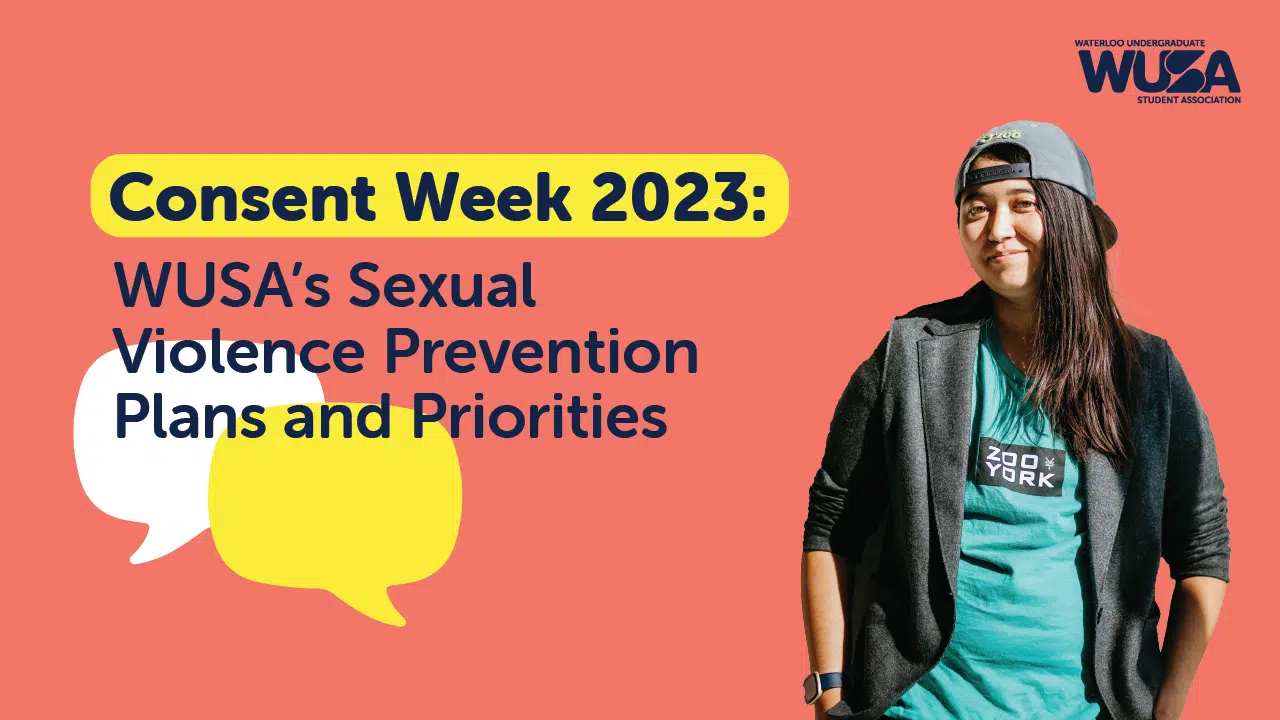Consent Week 2023: WUSA’s Sexual Violence Prevention Plans and Priorities

Written by: Anusha Akella
To understand and recognize the efforts that WUSA has put in to spread awareness on consent and promote safety on campus, we interviewed WUSA President Stephanie Ye-Mowe.
Questions on the goals and priorities WUSA has on action against sexual and gender-based violence were asked, here’s what Stephanie had to say:
Q: How can students help cultivate a culture of consent?
A: Consent doesn’t only apply to our intimate relationships – it applies to all our everyday interactions with friends, families, colleagues and even the strangers seated next to us on the city bus! Students can take action in our own communities by first holding themselves and those around them accountable, while helping peers do the same.
Showing survivors that we care by acting, as was seen at the student-organized grassroots march in October 2021 is just one way of effective activism and solidarity.
Supporting each other and by self-learning, students can – and often already do model what consent culture looks like. By participating in meaningful change in post-secondary spaces and holding institutions and governments accountable, students can go a long way to empower sex and gender-based violence survivors, activists, and experts such as Possibility Seeds, leading to a collaboration that can help build safer campuses.
Q: What is WUSA’s current priority for helping prevent sexual violence from happening on campus?
A: In WUSA’s 2022-2023 Roadmap, one of the Board’s priorities was supporting province-wide calls for action on sexual and gender-based violence prevention and response. In addition to pushing changes to legislation at OUSA’s Advocacy week, alongside 9 other student associations, we also participated in OUSA’s Consent Week Campaign.
We are especially pleased to see that on the UW campus, the Accessibility Services and Campus Wellness are making it easier for survivors to access supports, resources, and academic accommodations.
Since the province requires a university’s sexual violence response and prevention policy to be reviewed every 3 years, WUSA is keen to provide input during the review of Policy 42.
A major gap that currently exists is the issue with accounting for incidents occurring between students at different universities, and we hope to form a joint policy with Laurier soon. Beyond this, WUSA is also reviewing its own policies on this topic to ensure that students can access education, support, and clear pathways for reporting incidents.
Q: What work did WUSA do/support after the results of the 2018 Sexual Violence Survey that led to Bill 26 getting passed?
A: Much of the work WUSA does provincially is through OUSA, the Ontario Undergraduate Student Alliance, a coalition of student associations that has existed since the mid-90s and that WUSA is proud to have been a founding member of.
Sexual and gender-based violence prevention and response, is a deep-rooted advocacy priority for the OUSA. In August 2021, OUSA was invited by the Ministry of Colleges and Universities to provide consultation on faculty and staff inflicted sexual violence against students and in preparation for this, OUSA pulled from our pre-existing policies and recommendations on this issue. They also connected with Possibility Seeds to ensure that our message aligned with the experts of this field.
Our policies focus on creating safer, more accessible, and accountable reporting mechanisms.
Our belief that consent culture is built on trauma-informed and survivor centric models of responding to such issues, is the basis of OUSA’S main recommendation which asks for legislative changes to O. Reg 131/16 that integrate these approaches. Bill 26 was a result of this consultation and as it went through readings over the fall of 2022, OUSA continued to be involved by proposing amendments and speaking at a standing committee hearing.
(To learn about OUSA’s additional recommendations on these issues, read OUSA’s Gender-Based and Sexual Violence Prevention and Response policy paper here).
Q: During advocacy week Jessica Look, President of OUSA and Vice President External Affairs at Western’s University Students’ Council said, “We are looking forward to having productive conversations surrounding our priorities of affordability, sector sustainability, sexual and gender-based violence, and rural and northern students.” – What are the goals, priorities, and work that’s happening around this?
A: Our specific asks for the province on GBSVPR can be found here:
We run a Student Advocacy Conference annually in the fall where we pitch these priorities, and you can read about it here.
WUSA’s efforts to take action against sexual and gender-based violence, focused on spreading awareness on this topic (SGBVPR) continues. As the interview outlines, the active participation and involvement of students is necessary, so that a safe environment is created, with an emphasis on improved accessibility and accountability.
To learn more about OUSA’s advocacy priorities on GBSVPR, click here.
For more information on all of OUSA’s advocacy priorities, click here.
Published: Thursday, January 26, 2023
